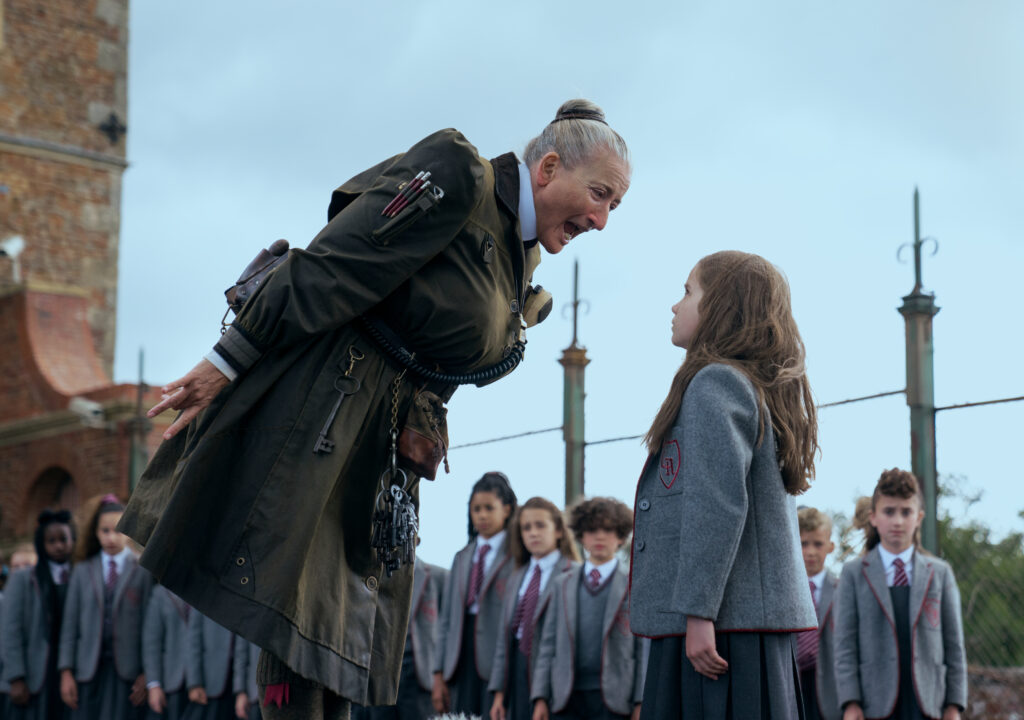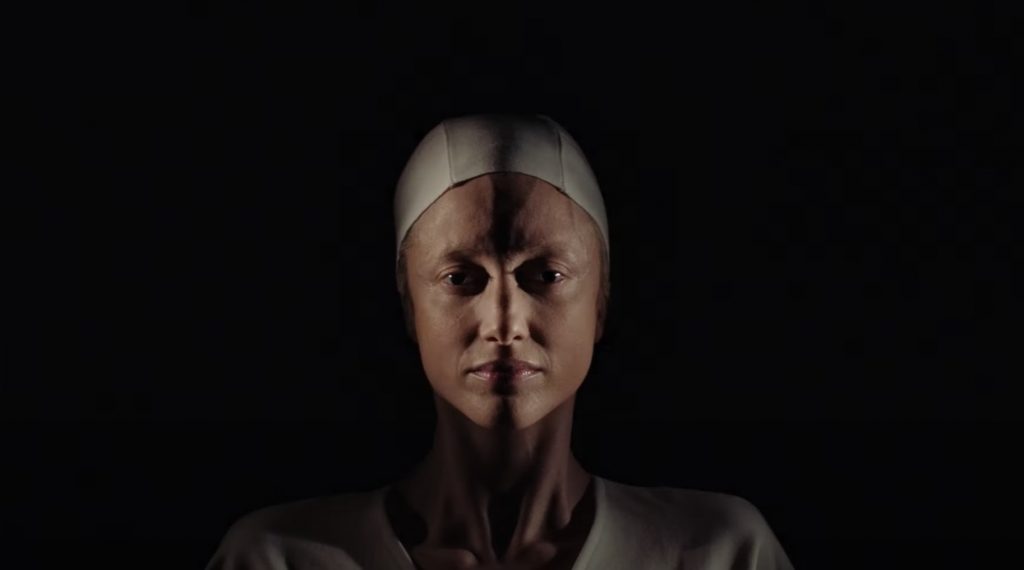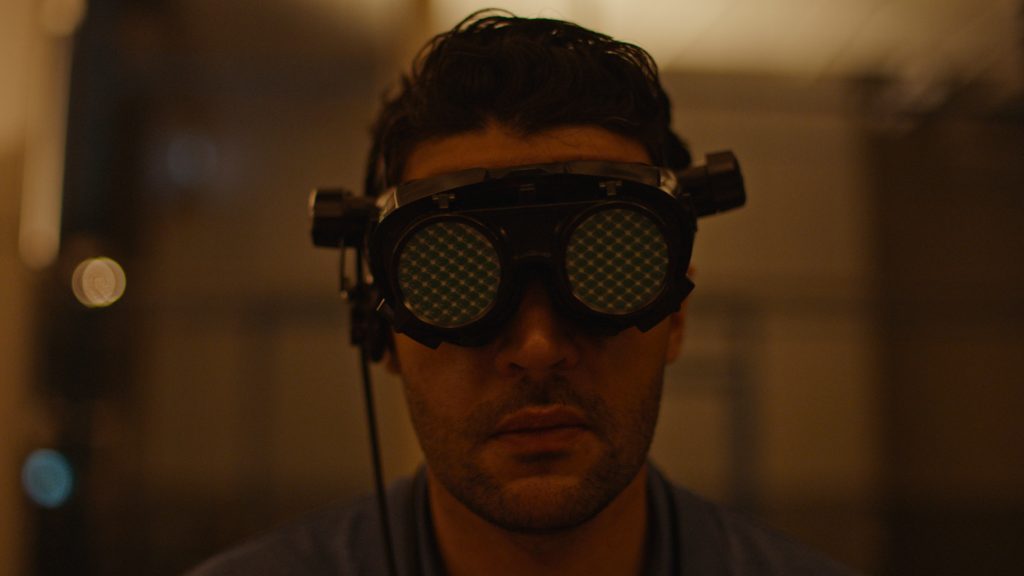January 8, 2023
by Carla Hay

“Roald Dahl’s Matilda the Musical”
Directed by Matthew Warchus
Culture Representation: Taking place in an unnamed city in England, this movie version of the Olivier-winning musical “Matilda the Musical” (which is based on Roald Dahl’s 1988 “Matilda” children’s book) features a predominantly white group of characters (with some black people and Asians) representing the working-class and middle-class.
Culture Clash: A highly intelligent, book-loving 5-year-old girl with neglectful parents is sent to a private school, where a caring English teacher becomes her mentor, and the school’s cruel headmistress becomes the girl’s enemy.
Culture Audience: In addition to appealing to the obvious target audience of fans of Dahl and previous “Matilda” adaptations, “Roald Dahl’s Matilda the Musical” will appeal primarily to people who are interested in watching a family-friendly musical with themes of good versus evil and taking a stand against bullying.

“Roald Dahl’s Matilda the Musical” takes the best aspects of the stage production and gives them a vibrant, cinematic version that delivers drama and comedy veering on the cartoonish. It’s a mixture of 1980s gaudiness and traditional British theater that mostly works well, but some viewers will be put off by some of the shrill aspects of this musical. Lashana Lynch’s performance is a delightful standout, for her portrayal of compassionate schoolteacher Miss Honey, one of the movie’s few characters with any real complexity and depth.
“Roald Dahl’s Matilda the Musical” is directed by Matthew Warchus, who won an Olivier Award in 2012, for the West End musical production of “Matilda,” which is based on Roald Dahl’s 1988 book of the same name. Warchus also received a Tony nomination for directing the Broadway musical version of “Matilda.” The first movie version of “Matilda” is a 1996 American (non-musical) comedy, directed by Danny DeVito (who also co-starred in the movie) and starring Mara Wilson in the title role. The songs from the “Matilda” stage musical (with music and lyrics by Tim Minchin) are also in “Roald Dahl’s Matilda the Musical.”
The world of “Roald Dahl’s Matilda the Musical” is set in the 1980s, and it’s filmed like a garish 1980s sitcom, when viewers are first introduced to the selfish low-lifes who will become Matilda’s parents. The movie’s opening scene takes place at a hospital maternity ward in an unnamed city in England. (The song “Miracle” is performed in this scene.)
Mr. Wormwood (played by Stephen Graham) is a ruffian who works as a used-car salesman and welder involved in shady business practices. Mrs. Wormwood (played by Andrea Riseborough) is an egomaniacal makeup artist whose only real passions are ballroom dancing and spending money on herself. Both spouses are not equipped to be good parents. But here they are in the maternity ward, as Mrs. Wormwood is giving birth to what these sleazy spouses hope will be a son.
When Matilda is born, Mr. and Mrs. Wormwood’s negative attitude about being parents gets even worse because this child is a girl, not the boy they wanted. Throughout Matilda’s young life, her parents refer to her using male pronouns, as if they can’t accept Matilda’s gender. Mr. and Mrs. Wormwood are neglectful parents who give Matilda the basics (food and shelter) but not love or proper guidance.
At 5 years old, Matilda (played by Alisha Weir) has learned to be self-sufficient. Matilda also has a mischievous side to her, such as a scene where she puts super glue in her father’s hat, which gets stuck to his head. She has become a voracious reader with the type of intelligence that makes her child prodigy in any subject and could easily put her on the level of genius. Influenced by many of the novels she has read, Matilda has a vivid imagination and can make up elaborate stories.
Matilda escapes from her unhappy home life by regularly spending time with Mrs. Phelps (played by Shindhu Vee), a librarian who owns and operates a bookmobile. In this movie, Mrs. Phelps is unfortunately a very underdeveloped character. Viewers will find out very little about Mrs. Phelps. The main purpose for Mrs. Phelps is for her to become fascinated when Matilda tells her a story (in stops and starts) about an escapologist (played by Carl Spencer) and an acrobat (played by Lauren Alexandra), who work at a circus, fall in love with each other, and experience a tragedy. This story comes to life in various scenes in the movie.
One day, Miss Honey and a school official colleague, who both work at the prestigious Crunchem Hall school, visit the Wormwood household because there is concern for Matilda’s welfare. Matilda has been homeschooled up until this point. Miss Honey tactfully asks Mr. and Mrs. Wormwood if Matilda can go to a traditional school so that she can be around other children. Mr. and Mrs. Wormwood say yes, not because it will benefit Matilda, but because they will no longer have to be responsible for educating her, and she will be spending less time at home.
Matilda quickly makes a friend at the school named Lavender (played by Rei Yamauchi Fulker), one of the schoolkid characters in this movie that could have used better character development. Other students who are featured in prominent speaking roles (but very little is revealed about them) are cheeky Eric (played by Andrei Shen), nervous Nigel (played by Ashton Robertson) and eager-to-please Bruce Bogtrotter (played Charlie Hodson-Prior), who gets a big moment in a famously uncomfortable scene involving chocolate cake. Matilda becomes the target of a student bully named Hortensia (played by Meesha Garbett), who is a stereotypical “mean girl.”
But the biggest bully at the school is headmistress Agatha Trunchbull (played by Emma Thompson, wearing hag-like makeup), who is very abusive (physically and verbally), and despises children so much, she often calls them “maggots.” The sign in front of Agatha’s office even says, “Maggots May Not Enter.” Everyone at the school is afraid of Agatha, except for Matilda. As Bruce comments soon after Matilda arrives at Crunchem Hall: “This isn’t a school. It’s a prison.”
Matilda soon stands out for having more academic knowledge than the teachers. Miss Honey is so impressed with Matilda, she tells Agatha that Matilda should be given the curriculum of someone who’s at least 11 years old. A jealous Agatha nixes the idea because she says that Matilda doesn’t deserve special treatment. Matilda soon becomes the focus of Agatha’s rage when Matilda shows that she’s not easily intimidated by this nasty school leader. Agatha is also prejudiced against Matilda because Agatha thinks Matilda’s parents are “gangsters, not intellectuals.”
The rest of the movie plays out exactly like you think it will, even for people who don’t know anything the the “Matilda” story. Thompson’s depiction of Agatha is a very campy, non-stop performance of “fire and brimstone” malevolence. The hairstyling, makeup and costume design are top-notch in in creating this character, and Thompson is certainly very talented, but it’s an entirely one-note portrayal that would have been more interesting if the filmmakers made Agatha’s personality a little less predictable and more nuanced.
The real heart of the story (and the best part of the movie) is the beautiful friendship that develops between Matilda and Miss Honey. Even though Matilda is wise beyond her years, she is still a child who needs positive and helpful adult guidance. Matilda and Miss Honey are kindred spirits who share an avid appreciation of books and a strong sense of personal ethics that includes standing up for people who are being treated unfairly.
In the role of Matilda, Weir makes an impressive feature-film debut as the feisty and resilient Matilda, who manages to charm, even when she’s being a pouty brat. Some of the pacing of “Roald Dahl’s Matilda the Musical” tends to drag in the middle of the movie. However, the last third of the film is by far the best section and makes up for any of the movie’s flaws. Lynch gives an emotionally stunning version of “My Home,” while Weir’s standout musical solo moment is with “Quiet.” And the “Revolting Children” song-and-dance sequence is an absolute, show-stopping high point.
Unfortunately, other than Matilda and Miss Honey, the characters in this movie are rather two-dimensional. The filmmakers of “Roald Dahl’s Matilda the Musical” missed an opportunity to create meaningful backstories and more compelling personalities for some of these other characters. The villains in the movie are complete caricatures and therefore entirely formulaic.
The movie also could have taken more time to explore the interpersonal relationships that Matilda has with her fellow students, because what is shown in the movie all looks very rushed and superficial. However, this is a musical that succeeds in most areas and stays true to the overall spirit of the “Matilda” book. “Roald Dahl’s Matilda the Musical” is not a masterpiece, but it’s entertaining enough to appeal to many generations and cultures.
Netflix released “Roald Dahl’s Matilda the Musical” in select U.S. cinemas on December 9, 2022. The movie premiered on Netflix on December 25, 2022.








